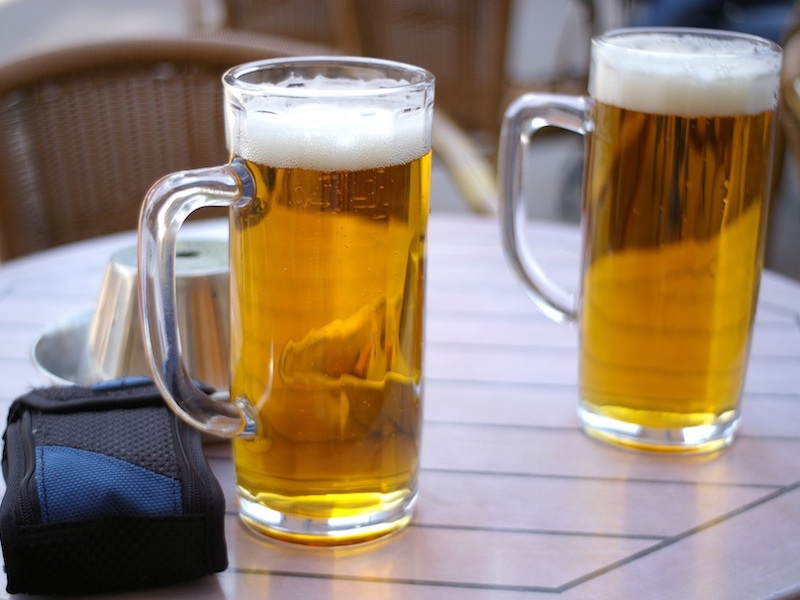Drinking with native speakers is great when you’re learning German or any other language. Alcohol can loosen the tongue and give you the courage to have a conversation and overcome any grammar mistakes. Enjoying a drink or two is especially important for German learners because Germany has a strong drinking culture and produces high quality beers, wines, and spirits.
The drinking culture in Germany is a bit different than in the United States. First of all, the minimum legal drinking age is sixteen (much lower than it is in America) and many German children will even drink with their families before reaching this age. Furthermore, alcohol plays a large role in everyday life. In fact, Germans call beer flüssiges Brot, which means “liquid bread.” That Germans treat beer like bread probably explains why they are third in the world for the most bottles of beer drunk per capita.
Along with a strong drinking culture comes a wide variety of alcohol, especially beer. Before the United States’ microbrewing trend blew up, Germans would often come to the United States, drink a Bud Light, throw their hands up in the air, and declare all American beer pisse Wasser (I’ll let you figure out what that means). In any case, German beer is diverse; every region has its own. This site has a pretty good breakdown of German beers. It’ll help you differentiate between a Helles and a Helles Bock.
In addition to beer, Germany is also known for its brandy and schnapps. Their wine is pretty good too, though some might dispute this. German schnapps is distilled from fruit and often served after meals to aid in digestion. On the other hand, most American schnapps is distilled from grain alcohol with added fruit flavors. So, despite the fact that the United States is catching up with their beer, Germany is still solidly winning the schnapps game. Therefore, if you’re visiting Germany and beer isn’t really your thing, you’ll have plenty of other options.
Now that you know a thing or two about German drinking culture and alcohol, here are some customs to keep in mind:
- Looking your drinking buddies in the eye: When drinking, be sure to look people in the eye when toasting. Otherwise, according to German superstition, you’re going to have seven years of bad sex.
- Formal dinners: At formal dinners, you should lift your glass by its stem and nod meaningfully at others.
- Refusing a drink: If someone refuses a drink, he or she doesn’t want a drink. This is slightly different than in other cultures.
If you really want to embrace German culture, you should know how to toast in german. Check out the following toasts. If you’re able to memorize all of them, you’ll get some major brownie points from your German friends.
Prost!
Translation: Cheers!
When to use it: Now you know how to say cheers in German. Prost is the German word for cheers. If you learn one toast, this is it. When drinking with German-speakers, saying Prost is nearly mandatory for every drink. After Guten Tag, Ich and other basic vocabulary, all German learners should know when and how to say cheers in german, just say Prost.
Zum wohl!
Translation: To your health!
When to use it: Zum wohl, like Prost, is a toast you can use for any occasion. It’s most appropriate, however, for formal occasions, especially if you’re drinking wine.
Genieße das Leben ständig! Du bist länger tot als lebendig!
Translation: Always enjoy life! You are dead longer than you are alive!
When to use it: Use this toast for birthdays. It’s a polite little toast that will get the job done and make everyone smile.
Du merkst, dass du älter wirst, wenn die Kerzen mehr kosten als der Kuchen!
Translation: You know that you’re older when the candles cost more than the cake!
When to use it: Another birthday toast, but for less formal occasions. You’ll want to make sure your audience likes “dad jokes.” You’ll also want to make sure you’re familiar with your audience. Using Du instead of Sie can be a major faux pas.
Wo früher meine Leber war, ist heute eine Minibar!
Translation: There is now a minibar where my liver once was.
When to use it: Use this if you’re already a few drinks in. Otherwise, this corny toast will likely fall flat.
Lasst euch nicht lumpen, hoch mit dem Humpen!
Translation: Don’t be a slouch, raise your glass!
When to use it: If you’re drinking with a more gregarious crowd, this is the toast for you. Make sure you raise your glass high as you yell out this toast.
Euch ist bekannt was wir bedürfen, wir wollen starke Getränke schlürfen.
Translation: You know what we need is to gulp down a strong drink.
When to use it: Using this toast with “intellectual” folks will quickly make you a fan favorite. The toast is a line from Goethe’s Faust.
Wunderbar! You’re now ready to make some friends and have some great drinks. Prost!
Hope now will be little easy for you to make friends after knowing how to toast in german.
Erik Lund is a writer and researcher for Whittled. You can reach him at [email protected].
Image Sources
Hero Image by Robin (CC BY 2.0)







